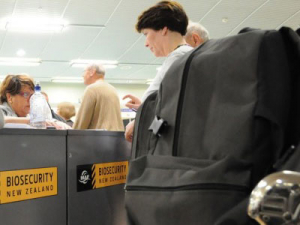Editorial: Happy days
OPINION: The year has started positively for New Zealand dairy farmers and things are likely to get better.
 MPI and the cruise ship industry are set to trial a new accreditation scheme to reduce the biosecurity risk posed by cruise passengers.
MPI and the cruise ship industry are set to trial a new accreditation scheme to reduce the biosecurity risk posed by cruise passengers.
The Ministry for Primary Industries and the cruise ship industry are set to trial a new accreditation scheme to reduce the biosecurity risk posed by arriving cruise passengers.
The scheme involves collecting background information about vessel stores to determine biosecurity risk, says MPI’s border clearance services director Steve Gilbert.
“Cruise ship passengers are usually very compliant when it comes to biosecurity. The risk material they bring ashore is mostly snack food from vessel stores.
“If we know where the stores have come from and what checks they have undergone, we can have peace of mind that any food that leaves the vessel is free of pests and diseases.”
The trial scheme also involves getting assurances from cruise lines that vessels have strict systems for pest control and they actively promote biosecurity messages, such as restrictions on carrying fruit fly-host materials like bananas and apples.
Gilbert says the scheme will have positive benefits for cruise ship passengers.
“It means we can reduce some of the biosecurity inspections we currently undertake on the gangway. That will result in speedier disembarkation for passengers, which creates a better experience for international visitors.
“It also frees up biosecurity staff to focus on higher risk areas, such as new flights coming in with passengers that are unfamiliar with New Zealand’s biosecurity rules.”
He says MPI will start regularly checking accredited cruise lines in November to ensure the agreed practices are being undertaken.
In some cases this will involve quarantine officers travelling aboard vessels.
He says unaccredited cruise ships will continue to face MPI’s full range of biosecurity compliance controls on arrival, including bag inspections, x-ray scanning and scrutiny by detector dogs.
“The joint scheme offers potential for improved biosecurity outcomes for New Zealand. It’s another layer of protection for the primary industries and New Zealand’s natural environment.”
In the 2015/2016 season, 32 international cruise ships made 466 port visits in New Zealand, unloading a total of 197,541 passengers.
The World Wide Sires National All Day Breeds Best Youth Camp Best All Rounder plaudit has become family affair, with 2026 Paramount Cup winner Holly Williams following in her sister Zara's footsteps.
DairyNZ is giving New Zealand farmers a unique opportunity to gain hands-on governance and leadership experience within the dairy sector.
Herd improvement company LIC has posted a 5.2% lift in half-year revenue, thanks to increasing demand for genetics.
According to the latest Fresh Produce Trend Report from United Fresh, 2026 will be a year where fruit and vegetables are shaped by cost pressures, rapid digital adoption, and a renewed focus on wellbeing at home.
The Roar is a highlight of the game hunting calendar in New Zealand, with thousands of hunters set to head for the hills to hunt male stags during March and April.
OPINION: The past few weeks have been tough on farms across the North Island: floods and storms have caused damage and disruption to families and businesses.